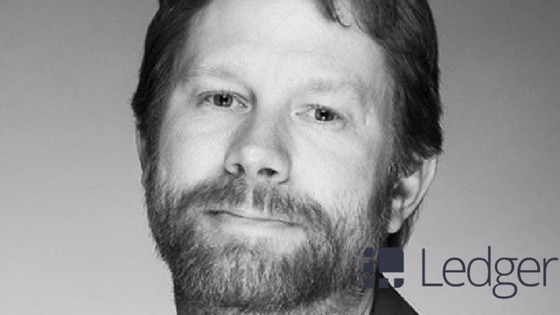Eric Larchevêque is the CEO of Ledger, the market-leading manufacturer of secure cryptocurrency hardware wallets. The company’s already sold more than one million wallets in 165 countries, and demand is set to rise as cryptocurrency enters the public conversation.
While Ledger is mainly known for its Nano S hardware wallet, the team has some exciting plans for the year ahead, and raised a cool $75 million in Series B financing in January.
I caught up with Larchevêque at MoneyConf in Dublin last month to find out how Ledger came into being, what effect cryptocurrencies and blockchain will have on the future, and how Ledger plans to conquer the enterprise space.
CC: So, this is a question that you’ve probably answered 5,000 times. But how did you first become interested in Bitcoin?
EL: A very good question. I’m an entrepreneur, and I have done a few startups in the internet and mobile industry. In 2013, I sold a price comparison engine, and I was looking for the next thing, like what would be the next adventure. And I was really looking for something, ideas, and was reading a lot of news articles and things.
I just came across Bitcoin because more people started at that time to speak more and more about it. And, of course, my first reaction was that I could not understand anything about this! Like, what is this? Play money? Ponzi? How can it work?
But it intrigued me, and what happened is I spent the next week or two weeks reading everything I could about Bitcoin and blockchain technology, and after a lot of time, it finally made sense, and I really understood the beauty of it, you know?
This technology which can create trust, results with transparency, with all the implications that it can have, and I was really struck by lightning. And for me, it was clear that it was the fourth industrial revolution.
I remember in ’96, I saw internet changing society, and I was sure that Bitcoin and this technology would change society as well. And so, it was clear to me that my next years would be fully dedicated to crypto. I started by opening a Bitcoin Center in Paris, which is a physical place where people can ask questions and have events and meetups. It was a way to do something, because initially, I did not know exactly what to do.
And this allowed me to meet other startups. And I met one startup which was coming from the security industry, the smart card industry. They were working on the first version of the hardware wallet. But it was very technically impossible to use.
CC: This was still in 2013?
EL: It was in 2014. But it was very technical, impossible to use, but I saw that the technology, the underlying technology was very strong, and it was working with a lot of startups. It was selling Bitcoin by UPS, you know, by postal services, and they needed to have a way to send the private key, the property titles of Bitcoin.
And so it needed a media, and I started to work with them to come up with a wallet. And we started to work together, and we really saw that we had the same vision, but blockchain technology, cryptocurrencies, could not scale without an endpoint situation. We decided to merge all our resources to create Ledger, and that was the end of 2014.
We introduced the hardware device; we introduced the fact that you need a hardware device to secure your Bitcoin. People said, “Why do I need a hardware device when I’m speaking about virtual currency?” But the position is changing, and people understand that cryptocurrencies are more physical than what we can see.
CC: Do you believe that blockchain technology is as important, if not more important, than the Internet?
EL: I don’t think it’s more important, because without internet, we wouldn’t have it! But I think that the impact is as strong as internet technology because cryptocurrencies and blockchain applications, the fact that you can really reconstruct complex government systems and applications on a decentralized system can really have big impacts on legacy, with the industry.
The first industry which is going to get completely impacted is the gaming industry because you can have fully blockchain-based cashing out, based on smart contracts where you don’t have all the costs of KYC – I mean, it’s transferred to exchanges. You don’t have all the costs of configuration of the games because it can be proved that you are not cheating, that everything is correct, with the smart contracts.
You do not have to pay all the extra bit fees for processing the funds, because if you are a casino, if you pay by credit card, it’s extremely expensive. You have a lot of security issues, but with blockchain technology, it’s just an example of a public industry which can be completely rebuilt on top of, like for instance, Ethereum, or the blockchain, and can work as a decentralized application.
This has a lot of benefits for the user, which is basically that the house edge can be reduced to the minimum because you don’t have all this cost which is created by the cost of regulation, license, from the casinos. So I believe that this industry is going to be massively impacted.
And then it will be banks, it will be retail banking, it will be insurance. It will change the way that we manage money because you can have money that you can program. And then it’s a lot of the fees and efforts. Into insurance, for instance, and also the cost of KYC, the cost of managing money which is not yours, the cost of regulation… With the blockchain application, it is much more flexible, it is much better, and so it will have a big impact on this industry.
CC: When do you think this will happen?
EL: So, it’s going to take a lot of time. We’re going to have to have stablecoins, there are a lot of things which are missing to build all these destructive applications. But I strongly believe that it will exist and that it will massively impact all these industries.
CC: And how informed do you think is the average person in France?
EL: I think that in France, the average person doesn’t know much about Bitcoin. They have heard about Bitcoin because we spoke about it on the TV and everything because of the craze of crypto last year. But I’m not sure that people understand.
The infrastructure of the biggest crypto market is the Netherlands. I don’t know why. The Netherlands, then Germany, then the United Kingdom, and then maybe France. But in France, we don’t have a big push into crypto.
But the government is really trying to give a very positive environment for startups and ICOs and everything, so I think that the general public is not very aware of crypto, but the government itself really wants to create this positive environment, because France has lost the battle of the internet.
Europe has lost the battle of the internet some years ago, and it’s like a trauma, and they don’t want to lose the battle of blockchain, so they are doing a lot of efforts not to stifle innovation due to bad regulation.
CC: Do you have the opportunity to work with the French government at all?
EL: Yes, yes, there are a lot of government bodies who are trying to know more about blockchain technology, and so there are some initiatives, there are some teams from the government at different levels who are trying to write reports of recommendations for the government, for the laws, etc.
Ledger is investing a lot of its time to make sure that we are part of all these initiatives, to verify that the level of knowledge is good, that basically our message can be heard, and so far it has been quite positive because I believe that there will be a good environment for crypto startups to really evolve and scale in France.
CC: So, for now, Ledger is mainly B2C. But you mentioned [during your talk] that for the rest of this year and into the future, you’re looking at enterprises. Do you think that stable regulation needs to be established before you’ll be able to fully onboard enterprises?
EL: Enterprises are really at the gates of cryptocurrencies. They are waiting to invest as much as they can. They have been playing with tens of millions, with hedge funds, etc. But it is true that in order to go to the highest level of investments they need to have a regulation because they are hedge funds or investment banks.
They are working in an environment which is controlled, and they have investors, LPs, limited partners, and no one wants to put money into something which is not completely understood. And so we are seeing a lot of advancements in the last months toward a framework for institutions to be able to invest into cryptocurrencies.
One of the last hurdles is security, because if you own hundreds of millions you need to have real security where you want to make sure that no one can run away with the money or get hacked. This is what we’re bringing with the Ledger Vault.
That’s why, in the industry, there has been a very positive response to our product because, basically, it’s a business enabler. As they can demonstrate that they can have the right governance and security, then it can allow the regulators to give them a green light on their projects.
And so as a business enabler, the valuable position is very clear for our customers. I think that 2019 will be really the year of institutional investment into cryptocurrencies.
It’s still going to take a few months to move forward and have all the regulatory green lights and the correct frameworks, but I think that it’s going to move in the right direction in that next year we are going to see billions from institutional money flowing into cryptocurrency.
CC: It’s going to be interesting… And you’re not leaving consumers behind?
EL: No, no. We have a 3-step strategy. The first is the hardware wallet for B2C. The second step is more enterprise and a SaaS solution, and the third step is more focused on the future is about IoT and connected objects.
CC: And do you find when there’s talk of regulation – especially with all the talk about the SEC sending out subpoenas – does that affect demand for your wallets? Have you noticed that has any kind of impact?
EL: So, the declarations from the SEC or impact of what regulators can say often have a direct impact on cryptocurrency prices. Bitcoin prices. And one thing is for sure, that the price of Bitcoin is directly impacting our level of sales. When it goes up we sell more; when it goes down we sell less.
So the B2C business of Ledger, which is selling our wallet to consumers globally, is completely tied to the scale and the value of the cryptocurrency markets. So indirectly, yes, our business is probably impacted by what the SEC can say or not say.
CC: Right. So, demand is basically affected by the prices. So I wanted to ask you, this year you raised $75 million. And this year we’ve been in a bear market, but you still managed to raise that amount. What are you planning to do with it? What have you done with it so far?
EL: We are indeed in a bear market, and this was something that – it was not a surprise for us, and I think it wasn’t a surprise for anyone to see that the crypto speculation, let’s say interest, has gone down a little bit, has cooled down, and that now we are more in the construction phase.
So our investors weren’t really fazed by that. But we still see a lot of opportunities: the consumer market, enterprise market, and also the additional market with IoT connected devices that need to interact with blockchain applications.
There are massive opportunities to come. And we have to make sure that Ledger can scale quickly to take all these markets, because the consumer market is not the same as the enterprise market, which is not the same as the traditional market. The business model, the processes are different, the teams are different, so we need to hire, we need to invest in research and development, and the cash is really the fuel to accelerate this growth.
And now what we are doing is scaling, is growing, is hiring, is building all these business units. And it doesn’t matter if the price is going up or down – I mean, it’s always better if it goes up, of course! But we are really committed to the big picture, and the big picture is that in the short-to-mid-term, the enterprise financial institutional money is going to flow into cryptocurrencies, so we need to have the Vault ready to scale.
And all these transformations I was speaking about in the introduction are going to arrive in three, five years, and we need to be here also with the solutions ready to go to market. And that needs to be, we need to invest in research and development now. That’s why we raised such a big amount.
CC: And is it hard to manage and scale such growth? You suddenly hired, you said, about 100 people?
EL: 100, yes, yes.
CC: Is it difficult to maintain your company culture?
EL: That’s a challenge for sure, and we don’t want to scale at the expense of customer service. Because when you go from 20 to 140 in six months, it can massively impact and change the company, and one of the roles of the CEO or the management is to keep the culture.
We have managed to get our success so far because we have this right culture of working, of being pragmatic, of having the right approach, it helped us a lot to scale, and so we are really trying to keep this culture.
We’re investing a lot into internal tools and the people inside to make sure that the company is not losing its focus or purpose while growing. So yes, it’s a challenge, and we are trying our best to maintain it.
CC: And are these people that you are hiring in France?
EL: So, most of it is in France, but we also have an office in San Francisco. We opened recently an office in New York, which basically will be the forefront for the business development of the Vault because we need to be at Wall Street, for all the hedge funds and all that.
So we are hiring a lot right now in New York, for instance, but all the core engineering will stay in France and we’ll stay in France because our technology is building on top of 40 years of smart card technology legacy, and all the engineers are French. So for once, to be French is really a good thing for us!
CC: That answers my next question then! You hear a lot with blockchain companies about a shortage of talent, a talent gap. Do you find that this is not the case? That you have available talent?
EL: I confirm that it is a challenge because not only do we need to find right engineers knowing about the blockchain protocol and cryptocurrencies – and it’s true that there are not a lot of people who are really good and expert at that – but also we need to have very strong engineers in secure hardware, which is a niche of the hardware industry, and it’s not easy to find this kind of talent.
But, we are finding, we are going to, but it’s true that it’s hard to scale because maybe you can find two or three, but certainly you cannot find 30, at least while keeping the quality that you’re expecting.
CC: Right. So, are there any measures in France at the grassroots level to start fostering blockchain talent?
EL: Yes, we have a lot of engineering and mathematics, and that’s why you see so many French in many parts of the world working either in engineering or in finance because we have a lot of very good engineering universities in France.
CC: I just have one more question, and then I’ll let you go!
EL: Yeah, of course.
CC: You mentioned the enterprise market and the SaaS market?
EL: Yes.
CC: So, Ledger is known as the hardware wallet. How does it translate to software? To a SaaS solution?
EL: To a SaaS solution. So, this device is a hardware wallet, so it’s a digital safe for private keys. Now, if you are a hedge fund and you have $100 million to secure, you could say, “Okay, I’m going to buy that,” no? But the question is, to whom do you give it? Where do you store it? It’s like giving $100 million in cash to your CFO or having it in the safe of your company. It doesn’t scale.
I mean, you have a big problem, and so no one can do that. What you need is governance. It means that for the account in Bitcoin or whatever, if you want to make a payment, you want multi-signature, you want time locks, you want rules, you know, to make sure that you have the governance and you control what can happen and you do not have any single point of failure.
So you cannot do that with this because these keys are for individuals. One key, one person. So the Vault is a solution where the private keys are stored in a secure server vault.
CC: But it is still cold storage?
EL: It is still cold storage, but at server enterprise level, which is replicated in some part of the world, and all the applications which people use to manage accounts is seen as a SaaS solution.
So it’s really a plug-and-play application that hedge funds can use without any integration, and each of the officers who have access to the funds can request payment or approve payment.
They have a hardware wallet which is used as an authenticator on our server platform. And then because we are using secure hardware, cold storage acts on the server side so that we can use a SaaS approach to deploy the solution very easily to our customers without having to install a lot of hardware and invest a lot of integrations.
And because we are using secure hardware cold storage on the server side, we can use a SaaS approach to deploy the solution very easily for our customers, without having to install a lot of hardware or invest in a lot of integrations.
CC: And is that ready?
EL: Yes. The Vault is ready. Now we are in what we call the early access phase where we have a limited set of 15 customers that we are onboarding with a limited set of features, and we plan to have the general availability of the Vault in September or October of this year.
CC: Amazing! So is it all work, work, work? Do you do anything to relax? Do you have any free time?
EL: I have my wife, my three kids, so as soon as I have some time I’m dedicating it to my family.
Wrapping It up
It’s pretty clear that the future of Ledger is intertwined with the future of cryptocurrency. And it’s encouraging to see such passionate believers in the space, despite 2018’s bear market.
What Ledger will be best known for next year, the year after, or in five years’ time remains to be seen. But one thing’s for sure: it will be a few steps ahead of the game.
Thank you very much, Eric Larchevêque!
Image(s): Shutterstock.com




